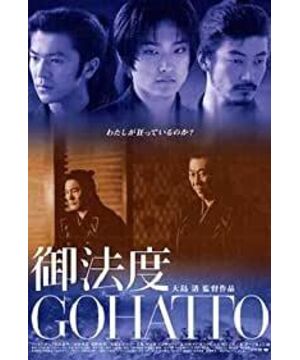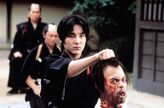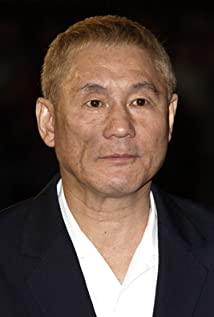Fadu is a human being, and all kinds of things are caused by the desire to restrict itself. Hence the formation of the first taboo. Superficial desires include violent desires, control desires, possessive desires, and erotic desires.
The control of desire, I think, should be the second-level test. Control over the first weight. Such a kind of relying on means to achieve control over the outside world of others. Whether it's people from the outside world, or things you want, there are careful plans and calculations. General provisions in the text are not recognized. Because he (Ghana) believes that he can control the desires of others to satisfy the desire to kill and to be close to the two borders (Okina can't say this). Garner's complex methods, framed and framed, and other methods have indeed realized his ideas, and he has followed his ideas step by step to the goal he wants.
According to the background of the movie's plot, the public consciousness of the 18-year-old boy is: in order to be able to kill. It is common to join a samurai organization out of the freedom to break this taboo. Others have also said something. An understandable little clue. The second is particularly puzzling:
1. Said to have a lover.
2, do not like women.
This should explain that the person he likes is not a woman first, and secondly, it should not be the warriors we have seen clearly.
Hijikata's words seemed to understand, the stories told by Okita were all leading in one direction. Garner loves Okita, so everything is for pick up.
Garner wants to get close to Okita, but Okita's bad man. He should have known. So he, Ghana will be challenging the control difficulty of desire? For a samurai who is obsessed with him, it is very easy to control. Okita, who is not obsessed with it, is undoubtedly an exciting challenge. Perhaps the temptation lurking within Ghana was to do just that.
The thrill of murder is absolute domination and destruction, the momentary climax of purpose and end. The control of desire is an unknown to be developed.
The director's words are also very hesitant and rambling, (Oshima Nagisa said: "The Imperial Law is actually... If I'm nitpicking, it's not a taboo, it's just official language! This story is about a group of crazy men fighting each other. In the meantime, inevitably, the killers fell in love with the same sex!").
Regarding the exploration of human nature, I always thought it was the exploration of the bottomless abyss. You can dig as deep as you can. Oshima has always been a deep diver. But this time he doesn't seem to know how deep he wants to dig and how deep he can dig. He has a feeling for the novel, and he has finished the work very delicately. What he wants to express and excavate has inertia. Won't stop just because his movies are over. Therefore, the audience's perception is also continued. When it was darker and darker, the clues were cut off abruptly.
Garner was killed, my simple understanding is that Okita's defense of his inner resistance. The lustful assault on him was perceived, and with his intelligence, it was clear. He has to choose to control his own desires and keep it in a bad way, then the only thing he can do is to kill Garner. My understanding is that he is not willing to accept any test. Whether it is the temptation to be full of conspiracy agencies approaching step by step, or the inevitable reaction in the heart.
My judgment is based on this common sense. For the transcendence of gender taboos and the corresponding desires, the true concentration is not fear, disgust, or liking. Okita said that he likes beautiful stories, and is full of disgust and disgust towards people. This emotional response was a little too strong in Kyoto in 1885. A stark and strong emotional contrast. The story is about this same-sex feeling, but it is full of disgust for the people in the story. The mystery and clues in this are the only channels for the remaining cracks.
But no one has absolute concentration. To paraphrase the phrase "no one has the willpower".
And the imagination that the earthwork keeps appearing is a clear indication. With bewilderingly confusing clarifications. As the same perplexer, his guesses coincided with ours. But is such speculation consistent with the real relationship and background of the characters?
It is not difficult to find clarity in the ambiguity, but the difficulty is that the ambiguity is full of countless divergent paths. The film itself cannot be controlled, and neither can the director.
About the last cut tree, and the possession of monsters. It is an easier association to understand it as a demon-desire. Another hint of Lenovo's Zen machine: Nanquan kills cats. Because the East Hall and the West Hall were fighting for a cat, Chan Master Nanquan just saw it and said to the monks of the two halls: If you can say something about Ziwu Maoyou, you can save the cat. If you can't, then I will kill it. the cat. The monks in the two halls didn't know how to answer, so Chan Master Nanquan killed the cat. When Zhaozhou came back from outside, Chan Master Nanquan told Zhaozhou what had just happened. After Zhaozhou heard it, he took off a shoe and put it on top of his head, turned around and went out. Master Nanquan said: If you were here just now, you would have rescued the cat.
For the Zen master to kill a cat in order to guide his disciples, it is a violation of the precepts. But without breaking the precepts, it is difficult to convey what he wants to convey. What it wants to convey is the "law" of Buddhism. The Buddhist teachings are taboos to kill, absolute taboos. Murder is one of the worst sins. Although cats are not people, they are also killing. It's a typical offense.
The samurai did not practice Zen, but the director did. Kill a temptation to never be tempted. The simple understanding is that demons cannot be killed. However, before the film begins, we don't quite know the background of the story. What we do know is that with the arrival of such a beautiful young man, a twisted and entangled complex relationship begins.
This shows that the desires of inner demons cannot be induced by anyone, and they are more tragic and powerful.
If the existence of Ghana is an internal temptation to the killer organization, then Okita's seemingly clear and beautiful appearance is another fatal temptation for Ghana. Ghana is to everyone, Okita is to Ghana, existence itself is a temptation, no matter whether it is intentional or unintentional.
In this way, monks who are suspected of violating the precepts by killing cats can be forgiven. For an organization that strictly organizes martial arts teams and is led by the shogunate, killing people is basically looking for things, and there are very normal operating procedures, reasons, and charges. Okita killing Ghana is the same as organizing to kill anyone who violates the taboo. There is no difference.
The organization wants to kill to ensure that the group exists to achieve political goals. In addition to the previous purpose of Okita Killing Garner, his materials and historical records are all excellent members of the organization, and he also adds personal belief in self-purity and maintenance of principles.
The control above the law is a kind of destruction of the law, and it belongs to the object that needs to be regulated.
Therefore, it can be said that they have chosen to control their desires, and the method adopted is to kill. This behavior cannot determine the trend and right or wrong of value. But there must be a basis that can be "used as" constant value judgment. Only then can all their words and deeds be explained clearly. Small-scale and staged, individual desire struggles, erotic desires, resistance and control, and control over control are all under the larger historical law.
View more about Taboo reviews











